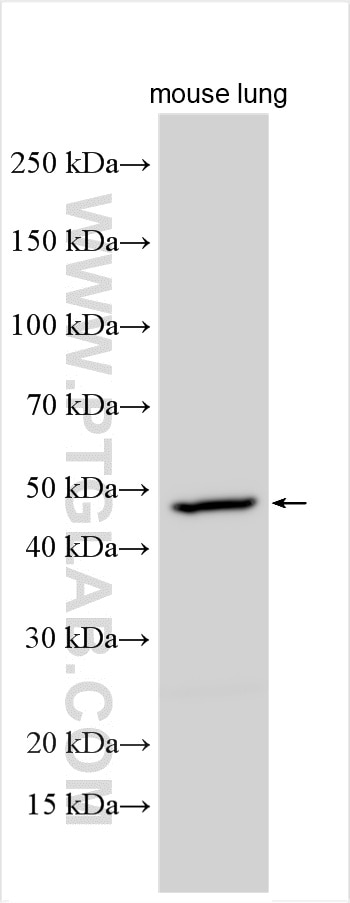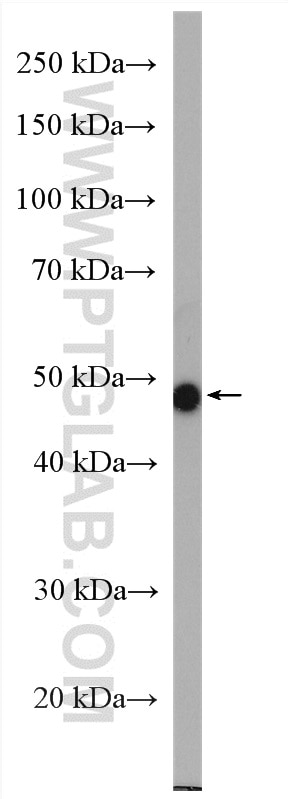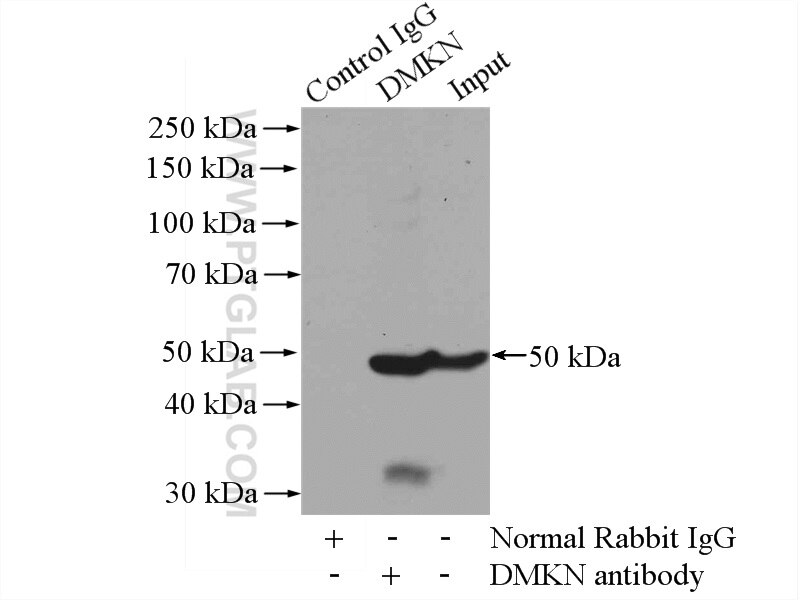DMKN Polyklonaler Antikörper
DMKN Polyklonal Antikörper für WB, IP, ELISA
Wirt / Isotyp
Kaninchen / IgG
Getestete Reaktivität
human, Maus
Anwendung
WB, IP, ELISA
Konjugation
Unkonjugiert
Kat-Nr. : 16252-1-AP
Synonyme
Geprüfte Anwendungen
| Erfolgreiche Detektion in WB | Mauslungengewebe, Maus-Eierstockgewebe |
| Erfolgreiche IP | Mauslungengewebe |
Empfohlene Verdünnung
| Anwendung | Verdünnung |
|---|---|
| Western Blot (WB) | WB : 1:500-1:2000 |
| Immunpräzipitation (IP) | IP : 0.5-4.0 ug for 1.0-3.0 mg of total protein lysate |
| It is recommended that this reagent should be titrated in each testing system to obtain optimal results. | |
| Sample-dependent, check data in validation data gallery | |
Veröffentlichte Anwendungen
| WB | See 1 publications below |
Produktinformation
16252-1-AP bindet in WB, IP, ELISA DMKN und zeigt Reaktivität mit human, Maus
| Getestete Reaktivität | human, Maus |
| In Publikationen genannte Reaktivität | Maus |
| Wirt / Isotyp | Kaninchen / IgG |
| Klonalität | Polyklonal |
| Typ | Antikörper |
| Immunogen | DMKN fusion protein Ag9242 |
| Vollständiger Name | dermokine |
| Berechnetes Molekulargewicht | 476 aa, 47 kDa |
| Beobachtetes Molekulargewicht | 48-55 kDa |
| GenBank-Zugangsnummer | BC011886 |
| Gene symbol | DMKN |
| Gene ID (NCBI) | 93099 |
| Konjugation | Unkonjugiert |
| Form | Liquid |
| Reinigungsmethode | Antigen-Affinitätsreinigung |
| Lagerungspuffer | PBS with 0.02% sodium azide and 50% glycerol |
| Lagerungsbedingungen | Bei -20°C lagern. Nach dem Versand ein Jahr lang stabil Aliquotieren ist bei -20oC Lagerung nicht notwendig. 20ul Größen enthalten 0,1% BSA. |
Hintergrundinformationen
DMKN, also named as epidermis-specific secreted protein SK30/SK89, acts as a soluble regulator of keratinocyte differentiation. DMKN has 16 isoforms with MW 9-20 kDa, 35-38 kDa and 42-48 kDa.
Protokolle
| PRODUKTSPEZIFISCHE PROTOKOLLE | |
|---|---|
| WB protocol for DMKN antibody 16252-1-AP | Protokoll herunterladen |
| IP protocol for DMKN antibody 16252-1-AP | Protokoll herunterladen |
| STANDARD-PROTOKOLLE | |
|---|---|
| Klicken Sie hier, um unsere Standardprotokolle anzuzeigen |
Publikationen
| Species | Application | Title |
|---|---|---|
Mol Cell Proteomics Deletion of cysteine cathepsins B or L yields differential impacts on murine skin proteome and degradome. | ||
Mol Cell Proteomics Matrix metalloproteinase 10 degradomics in keratinocytes and epidermal tissue identifies bioactive substrates with pleiotropic functions. |




